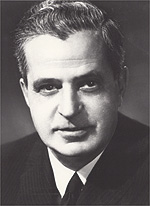Jean Jacques Bertrand
| Jean-Jacques Bertrand | |
|---|---|
 |
|
| 21st Premier of Quebec | |
|
In office October 2, 1968 – May 12, 1970 |
|
| Monarch | Elizabeth II |
| Lieutenant Governor | Hugues Lapointe |
| Preceded by | Daniel Johnson Sr. |
| Succeeded by | Robert Bourassa |
| MNA for Missisquoi | |
|
In office July 28, 1948 – February 22, 1973 |
|
| Preceded by | Henri Gosselin |
| Succeeded by | Glendon Pettes Brown |
| Personal details | |
| Born |
June 20, 1916 Sainte-Agathe-des-Monts, Quebec |
| Died | February 22, 1973 (aged 56) Montreal, Quebec |
| Political party | Union Nationale |
| Spouse(s) | Gabrielle Bertrand |
| Profession | lawyer |
Jean-Jacques Bertrand (French pronunciation: [ʒɑ̃ ʒɑk bɛʁtʁɑ̃]; June 20, 1916 – February 22, 1973) was the 21st Premier of Quebec, Canada, from October 2, 1968 to May 12, 1970. He led the Union Nationale party.
Bertrand served as Member of the Legislative Assembly for the District of Missisquoi from 1948 until his death in 1973.
He served as Minister of Lands and Forestry from 1958 to 1960 and briefly as Minister of Youth and Social Welfare until his party, the Union Nationale lost the provincial election in 1960.
Bertrand tried to become leader of the Union Nationale in 1961, but was defeated by his colleague Daniel Johnson, Sr., the MLA for the district of Bagot.
In 1966, the Union Nationale was put back in office and Premier Daniel Johnson, Sr. appointed Bertrand to his Cabinet. Bertrand served both as Education Minister until 1967 and Minister of Justice until Johnson's sudden death from a heart attack in 1968. In addition to those assignments, Bertrand was also Johnson's Deputy Premier.
Bertrand was chosen Acting Party Leader until a leadership convention could be held and therefore became Premier of Quebec.
His victory (58% of the delegates) over colleague Jean-Guy Cardinal (41%), Minister of Education and newly elected MLA for the district of Bagot, at the Leadership Convention of 1969, caused a deep division among party insiders. While Johnson had been more accommodating towards the more nationalist elements of the party, Bertrand clearly positioned himself as a federalist. Cardinal was considered the nationalist candidate in the race. His defeat prompted a number of supporters to leave the Union Nationale and join the Parti Québécois.
...
Wikipedia
